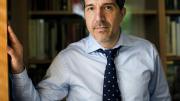Since becoming director of Harvard University Press (HUP) in September 2017, George Andreou has begun tackling the biggest challenges facing academic publishing—the rise of online scholarly publishing, changed economics in an eBook era, reduced purchasing budgets at academic and other libraries, and more (see “The ‘Wild West’ of Academic Publishing,” January-February 2015, page 56). He brings to the role his seasoned trade-publishing perspective. “Trade publishers have their kind of panoply of presentational techniques that aren’t as evident or vigorously evident in academic publishing,” explained the former vice president and senior editor at Alfred A. Knopf. “This does not mean one will become garish in one’s style, but only that there are insights into how you reach readers that are not always evident to academic publishers, and we mean to leverage them for our authors.”
This past July, Andreou implemented a broad reorganization of the Press. The changes included several layoffs and staff reassignments, as well as the announcement that Ken Carpenter, formerly vice president and associate publisher at Houghton Mifflin Harcourt, would become director of marketing in September. Editor-in-chief Susan Boehmer will depart in March 2019—and Andreou will absorb her role instead of appointing a replacement. “I have assumed that responsibility out of a sense gathered from direct experience that an editorially driven publisher needs to have the head of the house as editor-in-chief,” he said. “There are, as people who talk about publishing always remark, more books than ever,” he added. “How do you set them apart, how do you make a place for your book? I think that’s a matter of making sure you’ve got the best books you can have and publishing as if they were on the inside—that is to say, with a deep understanding of the book, what it’s trying to say, and to whom.”
As for the threat that digitization poses for print presses, Andreou said, “We are past the moment in the life of the industry where digitization is the fetish that it was. The last five to 10 years have shown us that print remains the dominant and preferred technology for books. Digital is an additional outlet, in the way audio is. It’s a different means of consumption, but it’s by no means attained the primacy that everyone expected it to do. We do make all our books available as eBooks, because that’s simply what a responsible publisher does now.”
Recalling his decision to leave Knopf to lead a preeminent academic publisher, Andreou said he looked forward to the opportunity to focus more on “books about ideas,” given a trade-publishing climate where the place for “serious nonfiction is shrinking—outside of certain perennial categories, like Civil War history, where the appetite tends to be endless.” He added that many of the writers with whom he started out at Knopf (as senior editor since 2003) wouldn’t be feasible trade authors any longer—“not because there isn’t an audience for them, but because the overhead structure of trade publishers makes it impossible to give the kind of attention to those books that is required to extract [their] full sales potential.”
By developing a laser-like focus on a target audience and realistic promotion opportunities for each title HUP chooses to publish, Andreou said, he hopes to avoid one of what he deems the biggest dangers in academic publishing: turning the press into a mere extension of the academic process by which scholars publish work to gain tenure. “A publisher has to publish for someone, so if it becomes too teleological in relation to the academic world, it will lose the vitality that any publisher should hope for,” he explained. “Academic publishers have to bear in mind what most publishers do, which is that the answer to most things is ‘No.’ And the ‘Yeses’ have to have good reasons for them. They have to be the exception.”








